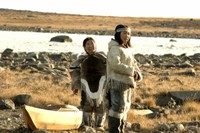Home
Featured

ᓇᖕᒥᓂᖅᐳᑦ ᐃᓄᐃᑦ TV | Authentic Inuit TV
Uvagut TV (meaning “Our” TV) is Canada’s first 24/7 Inuktut television channel. Uvagut TV broadcasts children’s shows, movies, documentaries, cultural and current affairs programming in Inuktut to communities across the north and throughout the country.

Isuma Video on Demand
Isuma’s exhibition in cyberspace presents a collection of Isuma and other indigenous-language films, including Atanarjuat The Fast Runner (Cannes Camera d’Or 2001); The Journals of Knud Rasmussen (opening film at 2006 Toronto International Film Festival); Before Tomorrow (by Igloolik’s Arnait women’s collective); Edge of the Knife, the world’s first feature film in the Haida language; and One Day in the Life of Noah Piugattuk.

Isuma Productions
ISUMA, meaning ‘to think,’ is a collective of Inuit-owned related companies based since 1990 in Igloolik, Nunavut with a southern office in Montreal. In January 1990 four partners Zacharias Kunuk, Paul Apak, Pauloosie Qulitalik and Norman Cohn incorporated Igloolik Isuma Productions Inc.

Qaisutniit Nileajut
Voices From Qaisut
Directed by Zacharias Kunuk
3 video portraits of Inuit Musicians from Igloolik, Nunavut
Angela Amarualik, Susan Avingaq, Kelly Fraser
Explore by Topic
Recommended Videos
Recommended Channels
Global Indigenous Media by Language

- Atikamekw, French (1)
- Awajun (1)
- Aymara (2)
- Blackfoot (4)
- Chatin (1)
- Chiquito (1)
- Cree (9)
- Dehcho (38)
- Denesuline (34)
- English (1168)
- French Français (88)
- Gitksan (5)
- Greek Ελληνικά (5)
- Gurung (1)
- Gwich'in (26)
- Haida (5)
- Inuinnaqtun (32)
- Inuktitut (1112)
- Inuvialuktun (1)
- Italian Italiano (1)
- K'iche (2)
- Kalaallisut (28)
- Kannada (1)
- Kaqchikel (3)
- Khanty (1)
- Kiche (1)
- Kichwa (4)
- Krenak (1)
- Ladino (1)
- Limbu (1)
- Magar (1)
- Mam (1)
- Mandarin (1)
- Māori (2)
- mapudungun (6)
- Maya Yucateco (1)
- Mazahua (3)
- Mi'kmaq (2)
- Mixe (3)
- Mohawk (1)
- Náhuatl (1)
- Nepal Bhasa (1)
- Nepali (1)
- Norwegian Bokmål Bokmål (2)
- Nuxálk (10)
- Ojibway (2)
- Pitjantjatjara (1)
- Portuguese, Brazil Português (4)
- Q'anjobal (1)
- Q'eqchi (2)
- Quechua (2)
- Rai (1)
- Sahtu (45)
- Sallirmiutun (1)
- Sámi (12)
- Sháshishálem (1)
- Spanish Español (55)
- Tamang (1)
- Tharu (1)
- Tlicho (48)
- Tlingit (4)
- Trumai (3)
- Tupi (1)
- Tzeltal (1)
- Tzotzil (2)
- Uummarmiutun (2)
- Waiãpi (1)
- Wayuunaiki (1)
- Wirrárika (23)
- Xaaydaa Kil (Haida) (2)
- Xavante (2)
- Yindjibarndi (2)
- zapoteco (1)






































